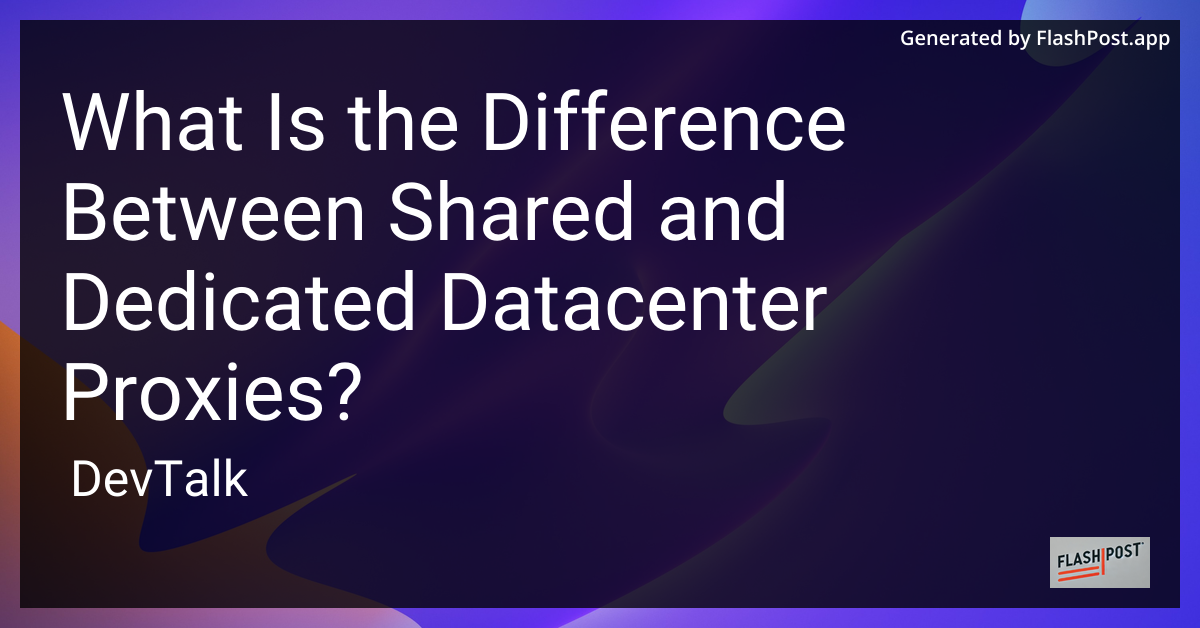What Is the Difference Between Shared and Dedicated Datacenter Proxies?

Understanding the Difference Between Shared and Dedicated Datacenter Proxies
In the vast landscape of internet connectivity, proxies play a critical role in ensuring anonymity, improving security, and optimizing network performance.
Among the various types of proxies, datacenter proxies are particularly popular for their speed and reliability. Within this category, users often encounter the dilemma of choosing between shared and dedicated datacenter proxies. In this article, we'll delve into the core differences between these two types and help you determine which one suits your needs best.
What Are Datacenter Proxies?
Datacenter proxies are IP addresses that originate from a secondary corporation instead of an Internet Service Provider (ISP). These proxies are not associated with an ISP, allowing users to mask their actual IP addresses for anonymity, data scraping, gaming, and other online activities that require enhanced privacy and performance.
Shared Datacenter Proxies
Shared datacenter proxies are IP addresses that are concurrently used by multiple users. Here’s a breakdown of their key characteristics:
-
Cost-effective: Being shared among several users, these proxies are usually more affordable. They are an excellent choice for users who need to perform basic tasks that don’t require high levels of bandwidth or exclusivity.
-
Available Bandwidth: Since the proxy is shared among multiple users, bandwidth can be limited, especially if other users are consuming a lot of resources at the same time.
-
Risk of Blacklisting: The likelihood of being blacklisted increases with shared proxies since any malicious activity by one user can affect others sharing the same IP.
Dedicated Datacenter Proxies
Dedicated datacenter proxies, on the other hand, are exclusively used by a single user. Here are their defining features:
-
Exclusivity: These proxies provide a unique IP address for sole use, ensuring optimal performance and reliability without the interference of others.
-
Higher Cost: Due to the exclusive nature, dedicated proxies tend to be more expensive compared to their shared counterparts. This investment can be worthwhile if your activities require consistent speed and low risk of blacklisting.
-
Enhanced Performance: With no bandwidth sharing, dedicated proxies offer faster speeds, making them ideal for tasks that demand high performance, such as web scraping, streaming, and gaming.
Choosing the Right Proxy
The decision between shared and dedicated datacenter proxies primarily depends on your specific needs. For activities requiring high speed and reliability, such as gaming or accessing platforms like TikTok, dedicated proxies are usually the best choice. However, for simpler tasks or when operating on a budget, shared proxies can efficiently handle the workload.
Additional Resources
-
Learn the difference between a VPN and a proxy for gaming to explore how proxies compare to VPNs in gaming scenarios.
-
Discover the best mobile proxy services for connecting over cellular networks, which can offer flexibility and mobility compared to static datacenter proxies.
-
Explore how to perform a TikTok proxy verification in 2025 to ensure your proxy setup is optimized for this popular social media platform.
In conclusion, both shared and dedicated datacenter proxies have unique advantages and trade-offs. By understanding your own requirements and evaluating the specific features of each type, you can make an informed decision that optimizes your online activities.